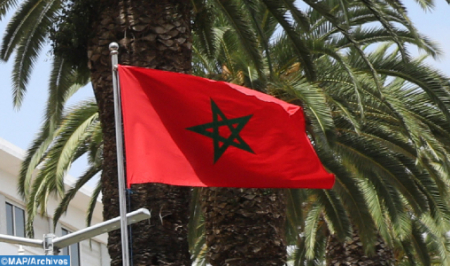Morocco Stands Out as Country of Stability, Security – Tunisian Expert
In a global context of uncertainty, Morocco has been able to assert itself as a country of stability, security and serenity, said the Tunisian political scientist, Mohamed Nejib Ouerghi. “It is a united country under the enlightened leadership of His Majesty King Mohammed VI, open and looking to the future with ambition and confidence,” he said in an interview with MAP on the occasion of the 23rd anniversary of the Throne Day. According to this former CEO of the Tunisian press agency “TAP”, the progress made by the Kingdom on all levels, political, diplomatic, economic, social, demonstrate the depth of the project of society and the relevance of choices. Clearly in view of a difficult international and regional situation, the effects of covid-19, the Russian-Ukrainian conflict, the surge in food and energy prices, the Kingdom is doing better than resist, he said. He noted that the Kingdom has managed to achieve achievements, make progress, accumulate achievements and strengthen its position both regionally and continentally. “Political stability, security unity, resilience to exogenous shocks, anticipation, perfect management of crises, implementation of a new development model, influence on the international and regional level, are not empty words or a mere figment of the imagination,” he said. According to this specialist in Maghrebi and Euro-Mediterranean relations, it is rather physical achievements that could be accomplished through a clear vision, a well-designed approach, a proven pragmatism and a determination to move forward on the path of sustained and inclusive development. It is on the political and international level that the Kingdom has managed to achieve tangible progress that has earned him the respect and recognition of the international community, he noted. He explained that Morocco acts more and more as a rational actor, choosing its diplomatic options according to precise objectives and in line with its national interest. “Today, Morocco presents itself as a regional power that counts and no one could disregard its rank and action for peace, security and stability in the region,” said Ouerghi. He pointed out that clearly, the most important achievements that Morocco has achieved are the broad international recognition of the Moroccanness of the Sahara, a file on which His Majesty King Mohammed VI has always held a firm and inflexible position, maintaining that “the Moroccanness of the Sahara is a truth as perennial as immutable” and that it “will never be on the agenda of any negotiation.” He said that to this end, the growing international recognition of the legitimacy of the Moroccan autonomy initiative as a “realistic” and “sustainable” solution to this artificial conflict, the increasingly constant condemnation of the activities of the separatists and the multiplication of consular openings in the southern provinces of the Kingdom testify to the soundness of the approach adopted by Morocco for the settlement of this conflict. “What best corroborates the rightness and relevance of the choices and policy directions initiated by HM King Mohammed VI, is obviously the support and recognition of the international community to everything that Morocco undertakes and proposes, “said this former editor of the Tunisian magazine “Realités” and the newspaper “La Presse”. He said that the testimony of the U.S. Secretary of State, Antony Blinken is in this regard symptomatic of the importance of the role and action played by Morocco on the international scene describing as “essential” the partnership of Washington with Morocco. He added that Moroccan diplomacy has proven its efficiency in the solution of many crises whether in the Sahel, Libya or in the management of several issues at the global level, particularly in the fight against the pandemic of COVID-19 and the issue of climate change. In Africa, the Kingdom, which has become a key player, is now able to play a role of locomotive for a harmonious co-emergence of the continent, he said. In this sense, he noted that the Kingdom has assets that allow it to transform its comparative advantages into competitive advantages. “The exemplary manner in which the kingdom has reoriented its industrial tool at the height of the health crisis of COVID-19 is the most eloquent evidence,” he continued. On the economic front, the researcher said that the projects undertaken by the Kingdom are producing the desired effect, noting that the first and not least relates to its energy security. The unilateral closure of the Maghreb-Europe gas pipeline by Algeria has not produced any negative impact on the Kingdom which has managed to revive its economic machine after the crisis of Covid-19, and to enter the international market for liquefied natural gas, he continued. According to him, the Moroccan economy has recovered after the downturn of Covid-19, recording a growth of 7.9% in 2021, after a deep recession of 7.2%. At the same time, Morocco has established itself as one of the leading international investors in Africa, with foreign direct investment (FDI) estimated at about 4 billion dollars in 2020, he revealed. He said that on the social level, the new development model (CSMD) has listed four main areas of transformation: diversified economy, strengthened human capital, inclusion of all and sustainability of territories, considering that today, the means are mobilized, notwithstanding an uncertain international environment to give this model effectiveness. In this sense, he recalled that the kingdom has planned in 2022 a “record” public investment of 245 billion dirhams with a draft budget (PLF) that “is based on three priorities: employment, education and health. In particular, it provides for the creation of 250,000 jobs over two years “for young people who have lost their jobs because of the crisis in the public works sector” and aid for some 50,000 other young people to set up businesses. With a sense of pragmatism and strengthened by a clear vision and unity without fail, Morocco continues its march in serenity, determination and confidence, he concluded.

